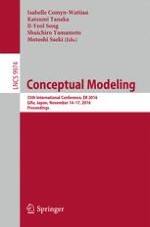2016 | OriginalPaper | Buchkapitel
An Ontological Approach for Identifying Software Variants: Specialization and Template Instantiation
verfasst von : Iris Reinhartz-Berger, Anna Zamansky, Yair Wand
Erschienen in: Conceptual Modeling
Aktivieren Sie unsere intelligente Suche, um passende Fachinhalte oder Patente zu finden.
Wählen Sie Textabschnitte aus um mit Künstlicher Intelligenz passenden Patente zu finden. powered by
Markieren Sie Textabschnitte, um KI-gestützt weitere passende Inhalte zu finden. powered by
